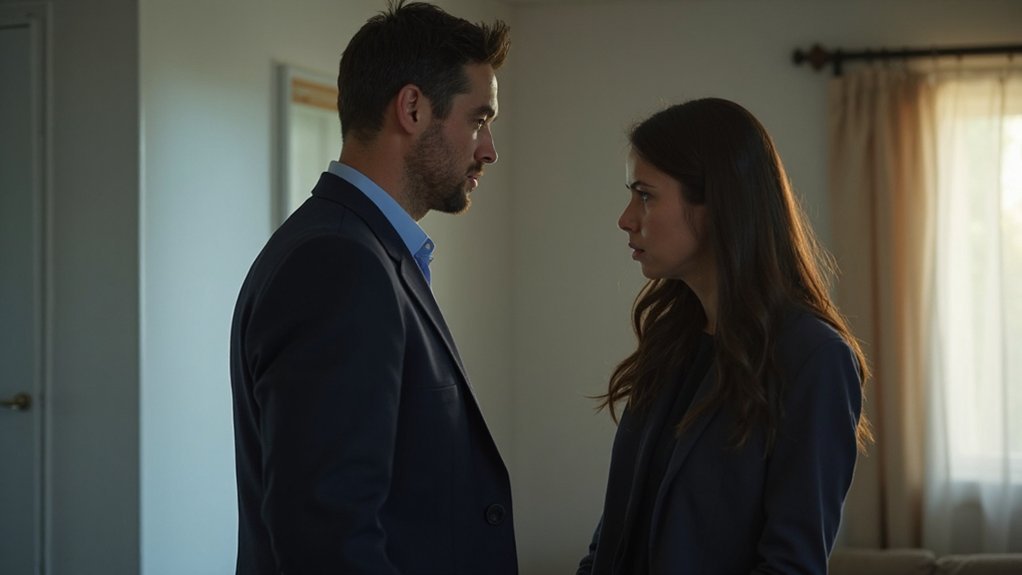You’ve probably wondered why your husband can’t just say those two simple words when he’s clearly wrong. The silence after an argument stretches on, and you’re left feeling unheard and frustrated. What you don’t realize is that his inability to apologize isn’t about stubbornness or lack of love—it’s driven by deep psychological patterns he might not even understand himself. These hidden barriers create a wall between his recognition of wrongdoing and his ability to express genuine remorse.
Pride and Fear of Vulnerability Make Apologies Feel Like Weakness

One of the most common reasons your husband avoids apologizing stems from deep-rooted ego that makes admitting mistakes feel like a personal defeat. His vanity creates a mental barrier where saying “I’m sorry” equals weakness in his mind.
When he knows his bad behavior hurts my feelings, he’ll often make excuses instead of facing the truth. The fear of appearing vulnerable terrifies him more than the damage his actions cause. He associates apologies with losing control or admitting inferiority.
This distorted thinking prevents him from understanding that choosing to take responsibility actually demonstrates strength, not self-importance. Sociopathic traits, such as a lack of empathy, can contribute to this avoidance of accountability.
Deep-Rooted Shame Prevents Him From Acknowledging Mistakes
While vanity appears to drive his refusal to apologize, shame often lurks beneath the surface as the real culprit. Deep-rooted shame makes him believe that acknowledging mistakes means he’s fundamentally flawed. Signs of resentment in a marriage, such as criticism and neglect, may contribute to his inability to take responsibility. This toxic mindset prevents taking responsibility because admitting wrongdoing feels like confirming his worst fears about himself. When you feel unheard and feel upset by his defensiveness, understand that childhood shame may be controlling his responses.
His inability to apologize damages your emotional connection, leaving you frustrated. Seek support through couples counseling, and encourage him to address these shame-based patterns individually to rebuild trust.
Childhood Patterns Where Apologies Were Never Modeled or Taught

If your husband grew up in a household where no one ever said “I’m sorry,” he simply doesn’t know how to apologize because it was never demonstrated or taught.
When your husband never apologizes, it doesn’t mean he doesn’t feel love for you. He likely learned that admitting mistakes makes you less important or weak. This childhood pattern can make you feel dismissed and hurt your mentally health.
Without proper modeling, he genuinely believes apologizing will make things worse rather than repair relationships. He needs to learn that saying “I’m sorry” strengthens bonds instead of weakening them. A prayerful approach can help soften his heart and guide him towards creating a more loving and understanding atmosphere in your marriage.
Genuine Belief That His Actions Were Justified and Reasonable
When your husband genuinely believes his actions were completely justified and reasonable, he won’t apologize because he doesn’t think he did anything wrong. Even when he says something hurtful, his outlook makes him feel vindicated.
This mentally health-challenging situation means he can’t see your viewpoint or acknowledge how his behavior affects you emotionally and physically. You need to know that his inability to recognize harm prevents genuine reconciliation. Navigating a Loveless Marriage can provide strategies to emotionally survive this type of relationship.
Terror of Conflict Escalation and Potential Relationship Rejection

Your husband’s refusal to apologize might stem from a completely different source – his deep-seated fear that saying “I’m sorry” will make everything worse. He’s terrified that once he’s said sorry, you’ll release more anger or even leave him entirely.
This fear paralyzes him from taking responsibility, even though an apology would actually help you feel better. His mental health may be affected by childhood experiences where mistakes led to harsh punishment. When asking for an apology feels impossible for him, it impacts the state of your marriage and prevents you from receiving the support you deserve.
Lack of Emotional Intelligence to Recognize the Impact on Others
Some husbands lack the emotional intelligence to understand how their words and actions affect you, which explains why they don’t see the need to apologize. These men struggle to recognize when they’ve hurt your feelings or damaged trust.
People find it difficult to offer a heartfelt apology when they can’t grasp the emotional impact of their behavior. Your husband may need to feel genuine remorse before he’ll say I’m sorry.
If he’s physically abusive, prioritize your safety immediately. Otherwise, consider what steps to take to help him develop better emotional awareness, because one day this disconnect could permanently damage your relationship.
Conclusion
Understanding why your husband won’t apologize doesn’t excuse his behavior, but it helps you respond more effectively. Whether it’s ego, shame, childhood patterns, or fear, these reasons reveal deeper emotional struggles he needs to address. You can’t force an apology, but you can set boundaries and communicate your needs clearly. If he’s unwilling to work on this pattern, consider couples counseling to break through these destructive communication barriers together.

